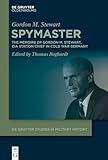Spymaster : The Memoirs of Gordon M. Stewart, CIA Station Chief in Cold War Germany / Gordon Stewart; ed. by Thomas Boghardt.
Material type: TextSeries: De Gruyter Studies in Military History ; 11Publisher: Mnchen ; Wien : De Gruyter Oldenbourg, [2024]Copyright date: 2024Description: 1 online resource (XIV, 198 p.)Content type:
TextSeries: De Gruyter Studies in Military History ; 11Publisher: Mnchen ; Wien : De Gruyter Oldenbourg, [2024]Copyright date: 2024Description: 1 online resource (XIV, 198 p.)Content type: - 9783111348445
- 9783111349268
- 9783111348988
- 943
- online - DeGruyter
- Issued also in print.
| Item type | Current library | Call number | URL | Status | Notes | Barcode | |
|---|---|---|---|---|---|---|---|
 eBook
eBook
|
Biblioteca "Angelicum" Pont. Univ. S.Tommaso d'Aquino Nuvola online | online - DeGruyter (Browse shelf(Opens below)) | Online access | Not for loan (Accesso limitato) | Accesso per gli utenti autorizzati / Access for authorized users | (dgr)9783111348988 |
Frontmatter -- Endorsements -- Acknowledgement -- Preface -- Contents -- Gordon M. Stewart and the CIA in Cold War Germany -- Our Family -- From Corning to Karlsruhe: Memoirs of a CIA Original -- Introduction -- 1 Childhood in Corning -- 2 Adolescence in Oak Park -- 3 Visiting Student in Munich -- 4 Student at the University of Rochester -- 5 Visiting Student in Hamburg -- 6 Work and Studies in Chicago -- 7 The U.S. Army -- 8 The Office of Strategic Services -- 9 Victory in Europe -- 10 The Strategic Services Unit -- 11 Heidelberg -- 12 Karlsruhe -- 13 Cold War Intelligence -- 14 Pastimes -- 15 The CIA Settles In -- 16 Station Chief in Frankfurt -- Epilogue -- Appendix -- Email by Peter M. F. Sichel to Alexander Branger, 6 December 2020 -- Timeline -- Further Reading
restricted access online access with authorization star
http://purl.org/coar/access_right/c_16ec
Germany was the epicenter of the Cold War. Across the Iron Curtain, hundreds of thousands of soldiers faced each other, and if World War III were to break out, contemporaries feared, surely it would happen here. The country’s frontline status made it an El Dorado for spies, who gathered information on military targets, penetrated political parties, and trained partisans for stay-behind operations. For the Americans, the Central Intelligence Agency (CIA) came to take the lead in this silent – and sometimes not so silent – contest. In the heyday of the Cold War, the agency’s German station employed nearly two thousand officers – in addition to countless spies and informants. Ultimately, this covert empire reported to the CIA station chief in West Germany and his deputy. And for many years, either of those positions was held by Gordon Matthews Stewart. Gordon Stewart was well prepared for this assignment. He studied German history and literature during the 1930s and lived in Munich and Hamburg as a visiting student. Here, he personally witnessed the Nazi takeover, even catching a glimpse of Adolf Hitler at one of his notorious rallies. When the United States entered the war in 1941, the newly established Office of Strategic Services (OSS) recruited him as a specialist on German affairs. In the summer of 1945, he arrived in Germany with an OSS detachment. Eventually, the OSS morphed into the CIA, and Gordon Stewart would run the agency’s espionage organization in Germany for some twenty years. From CIA headquarters in Heidelberg, Karlsruhe, Frankfurt, and eventually, Bonn, Mr. Stewart directed all intelligence operations in central Europe. Initially, he hunted down Nazi war criminals, but the Cold War compelled him to bend his efforts toward the Soviet bloc. During the 1950s, Mr. Stewart directed espionage operations against East Germany, organized the training of Ukrainian partisans at U.S. bases in Bavaria, and participated in a scheme to dig a tunnel into East Berlin to eavesdrop on Soviet and East German communications. He also recruited and handled sources inside the West German government, including the chief of the Bundesnachrichtendienst, Reinhard Gehlen; the highest-ranking West German military officer, General Adolf Heusinger; and top policy-makers of the Christian and social democratic parties. Mr. Stewart’s memoirs, introduced by renowned intelligence scholar Thomas Boghardt, offer not only a fascinating look inside the CIA’s largest overseas station; they also tell the story of a deeply conscientious and highly accomplished intelligence officer, whose experience, intellect, and moral compass shaped American policy toward Germany and Europe during the turbulent years of the early Cold War.
Issued also in print.
Mode of access: Internet via World Wide Web.
In English.
Description based on online resource; title from PDF title page (publisher's Web site, viewed 20. Nov 2024)


